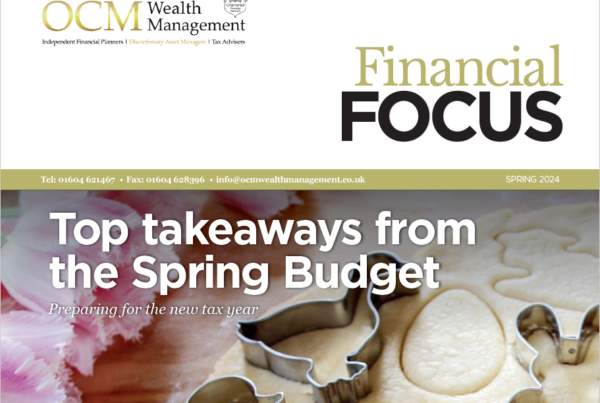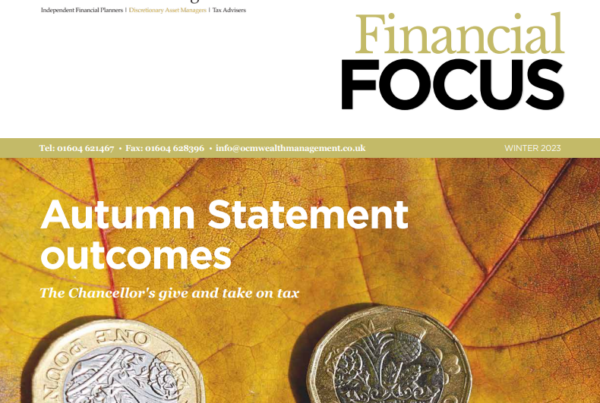New Tax Year, New You?
At OCM, we know how fast time flies when you’re having fun. With the new tax year now underway, our experts provide their top tips on how to manage your finances throughout the year to avoid the annual tax year-end panic!
Preparation is key!
It is key to remember that effective tax planning should not just be done at the end of the tax year, and instead should be considered throughout. Doing so helps to avoid complications or unforeseen issues, so it is always better to get on with your tax planning as soon as possible. Tax planning should be done alongside a holistic financial plan, to ensure you make the most of your annual allowances. Our tip would be to develop a detailed plan with an adviser throughout the year, ensuring you’re best positioned to achieve your financial goals.
Consider Your Pension Contributions
Pensions technically have no limits when it comes to the contributions one can make within the tax year, however there are limits on the amounts individuals can receive tax relief on. These are equivalent to an individual’s relevant UK earnings up to a maximum of £40,000, or a maximum of £3,600 per tax year if you have no relevant earnings. The Annual Allowance is the amount that can be paid in from all sources before being subject to the Annual Allowance tax charge. For the majority, the standard allowance is £40,000; however, it may be lower for certain individuals if they are affected by tapering, and can be reduced to £4,000 for a given year. It is important to confirm your position when considering pension contributions. If you have the funds available and your position allows for it, it is always worth considering making lump sum personal pension contributions. For example, a higher rate taxpayer could benefit from tax relief on their contributions at 40%.
Review Your Investment Accounts
When considering the tax implications of investment accounts, it is important to remember that there are several different types of returns which may be generated: capital gains, dividends or interest. Each have their own allowances and tax rates. In order to make a gain, an asset must be sold. The Capital Gains Tax allowance is currently £12,300 per annum, but it is important to remember that any losses which have already been realised from other assets could be used against gains for the tax year. Any gains which are within the annual exemption are tax free. The current rates of Capital Gains Tax, for gains above the annual exemption, are 10% for basic rate taxpayers and 20% for higher and additional rate taxpayers (18% and 28% for gains on residential property).
The Dividend allowance is set at £2,000 for all individuals whether they are basic, higher or additional rate taxpayers. Dividends received above this amount are taxed at 8.75%, 33.75% and 39.35% respectively for each rate.
Interest received by an individual benefits from the personal savings allowances, which is £1,000 for a basic rate taxpayer, and reduces to £500 for a higher rate taxpayer and to nil for an additional rate taxpayer. Where possible, it is always beneficial to utilise all available allowances within the tax year; by doing so you can maximise your tax-free income. It also worth considering apportioning interest-bearing assets between spouses and civil partners to make use of the available allowances.
Evaluate the Benefits of Subscribing to an Individual Savings Account (ISA)
When it comes to tax planning, one of the simplest forms to increase the tax-efficiency of your savings is by utilising an ISA account, as every individual has an annual ISA allowance of £20,000. All gains, dividends or interest within an ISA are completely tax free within this wrapper, and therefore an individual can benefit substantially over the long term if they have built a significant ISA pot. Whether you earn 1p or £10,000 on your investments within the ISA, no tax will be paid. It is important to remember that the ISA allowance can not be brought forward from previous tax years and therefore it works on a use it or lose it basis. This emphasises the importance of making that contribution during the tax year, should you decide this is the best route to consolidate your savings. If you’re considering making a contribution to an ISA, it is worth considering this earlier on in the year, allowing gains to accumulate within the wrapper over the year, rather than holding the funds outside of the wrapper and waiting until the end of the year.
Planning is Everything!
As you can see, there are numerous ways an individual can reduce the tax they pay within a given tax year; however if you haven’t considered all of the factors mentioned in your financial plans yet, don’t worry! Our trusted advisers are always on hand to provide support and guidance where needed to ensure that you are well positioned to make the most of your allowances and successfully navigate the 2022/23 tax year.
If you would like more information or guidance regarding the items discussed or would like to consider how you could better manage your tax position, please contact us on 01604 621467.
Kitt Wallace | Wealth Manager
Past performance cannot be used as a guide to future performance and the value of your investment will fall as well as rise in value. You may not get back all of your investment and the final value of your investment will depend on the performance of your portfolio. The actual performance of an individual client’s portfolio may differ due to different funds being used and being restricted in relation to certain asset allocations. Performance figures quoted include fund manager charges but exclude adviser, discretionary, custodian and switch charges. Unless stated, income is reinvested into the portfolio. The information contained in in this document is for information purposes only. It does not constitute advice or a recommendation or an offer or solicitation for investment.
OCM Wealth Management Limited is authorised and regulated by the Financial Conduct Authority (FCA Registration No: 418826) OCM Asset Management is a trading name of OCM Wealth Management Limited.



